Starting a Business Straight Out of School? How HBS Supports Student Entrepreneurship
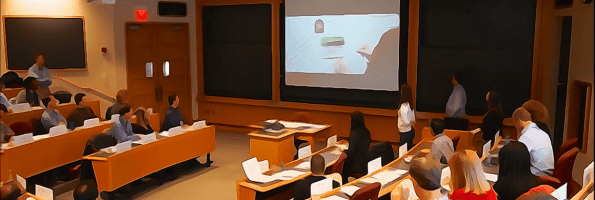
This coming weekend, Harvard Business School (HBS) will host an annual Entrepreneurship Conference sponsored by its own homegrown Entrepreneurship Club. The conference brings together hundreds of participants including “founders, joiners, and venture capitalists,” all of whom hope to connect through a smorgasbord of lectures, panels, chats, and networking sessions.
This year’s conference, scheduled for Saturday, March 31, is expected to draw more than 500 participants, including many top professors and professionals holding court on a variety of topics. Three keynote lectures will be given by CEOs and founders from Catalant Technologies, Strava, and edX. Strava’s Michael Horvath, who is also a professor of entrepreneurship at Dartmouth’s Tuck School of Business, will share his experiences having held several high-level roles at multiple startups.

Tuck Professor and Strava Co-Founder Michael Horvath will give one of the Entrepreneurship Conference’s keynote addresses.
In addition to the keynote lectures, the conference is also stacked with nine different panels. Some will include general discussions on topics such as starting a business during your MBA program and financing your startup. Others are more specific, covering some of the hottest fields in entrepreneurship right now. Examples of these include “Blockchain: The Next Transformative Technology?” and “AI/ML: Artificial Intelligence in Diverse Contexts.” Finally, attendees will also get to take part in a venture capitalist meet-and-greet and a networking lunch and cocktail hour.
HBS is extremely supportive of entrepreneurship, according to Jim Aisner, the school’s director of media and public relations. He spoke at length about the myriad ways in which HBS is a fantastic place for both seasoned and budding entrepreneurs, underscoring the range of support Harvard’s large entrepreneurial community offers to those looking to start their own businesses.
“Entrepreneurship is a major component of life at HBS, with some 35 faculty members doing research, course development, mentoring/advising, and teaching in this area,” Aisner told Clear Admit.
Harvard’s program requires all first-year MBA students to take an entrepreneurship course, and there are also a large number of entrepreneurial-focused electives on offer in the second-year Elective Curriculum. In addition, the school boasts multiple conferences and events that reach programs outside the business school. “There is a whole ecosystem [at Harvard] promoting and nurturing entrepreneurship,” Aisner notes.
Significant Programming Supports HBS Student Entrepreneurs
HBS is also home to the Arthur Rock Center Accelerator, which helps selected teams develop their ventures over the course of the year. In addition, the Rock Accelerator offers summer fellowships to support students from the entire student body who seek to develop entrepreneurial ventures during the summer and hosts a semiannual conference that brings 100 alumni back to campus each year.
Rock Venture Partners is a program that lets small groups of students learn more about investing in startups by supporting Rock Accelerator teams as they go through pitching and starting their ventures. Then there is the Harvard Innovation Lab, or i-lab, a resource available to current students at any Harvard school interested in exploring innovation and entrepreneurship at any stage. “The Innovation Lab creates a hotbed of cross fertilization for teams from across the university,” says Aisner.
Given this supportive environment, it won’t come as a shock that many HBS students decide to start their own businesses rather than pursue a more traditional career path in their post-MBA life. Out of more than 900 students, eight percent of graduates from the Class of 2017 chose to start their own businesses upon graduation, up from six percent in the Class of 2016. Although this growth is indicative of a national trend toward more and more recent MBA grads founding startups, HBS outperforms many top schools in this regard. By comparison, at Chicago Booth just 3.2 percent of 2017 MBA grads went immediately into running their own startups. Meanwhile, at the University of Pennsylvania’s Wharton School, just 2.3 percent of the most recent graduating class founded businesses.
As another indicator of its commitment to fostering entrepreneurship, HBS will host its annual New Venture Competition on April 18th, which bestows more than $300,000 in prize money to outstanding new ventures. Contestants may apply in either the business track, with ventures that drive substantial market value, or the social enterprise track, with ventures that drive social change. This recent Clear Admit article noted that the social enterprise track received 69 entries this year, more than ever before.
Nationwide, more and more students have begun to pursue startups at all stages of their MBA careers. From this weekend’s student-led Entrepreneurship Conference to the wide range of related centers, faculty, and other support, HBS’s investment in nurturing its entrepreneurial students is clear.
This article has been edited and republished with permissions from our sister site, Clear Admit.
The Best Business Schools for Landing Top Consulting Jobs
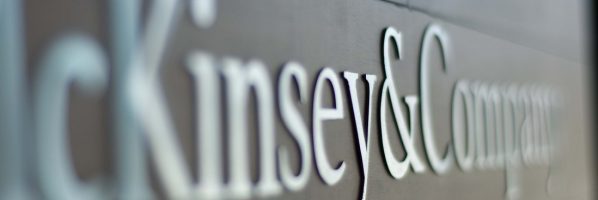
Clear Admit recently explored which business schools help prepare MBAs the most for a career in consulting, which you can read below.
With starting salaries in the $140,000 to $150,000 range and a customary $25,000 signing bonus on top of that, it’s no wonder so many business school students target the prestige consulting firms known as the “MBB”—McKinsey & Company, Boston Consulting Group (BCG), and Bain & Company—as their post-MBA landing pads. That $170,000+ annual compensation package can quickly cut any MBA loan debt you may have taken on down to size.
Indeed, management consulting has been one of the most coveted career paths for fresh MBA grads for ages. And though the technology industry has in recent years been stealing some grads from the consulting industry’s traditional slice of the pie, the most recent MBA employment reports reveal that consulting is already making a comeback against tech at certain schools.
The opportunity to work with a range of clients comprised of many of the world’s most celebrated businesses across industries—tech included—is part of the appeal of consulting. In many ways, a top consulting gig allows MBA grads to continue their management education while getting paid for it—and further honing their skills and expertise by helping solve a wide variety of business challenges. And, not for nothing, breaking into the MBB is a highly competitive pursuit—one that almost assures that your colleagues will be smart, driven people you’ll get a lot out of working with.
Finally, where the top consulting firms are choosing to find their talent reflects on the quality of the education those schools’ students are getting. In many ways, the hiring practices of the MBB can serve as a gold star standard of sorts for MBA programs.
Elite Firms Hire Grads from Elite Business Schools
The crème de la crème of leading business school talent has headed toward the top consulting firms for decades—and performed well there—creating a virtuous circle of sorts in which the firms’ appetite for such talent only grows. And while this piece focuses on MBB, we should note that a host of other consulting firms—Deloitte, A.T. Kearney, Accenture, Strategy&, and Oliver Wyman among others—are also highly prized post-MBA destinations.
If you are looking to see which business schools send the greatest percentage of their graduates into consulting overall, don’t miss our September 2017 analysis of leading consulting industry feeder schools. Which schools top the list? And what stands out about how these schools successfully train students for careers in consulting?
Looking at Class of 2016 graduates, the University of Virginia’s Darden School led the pack, with 38 percent of its graduates heading into consulting. Columbia Business School was next, sending 35 percent, followed closely by Northwestern University’s Kellogg School of Management, which sent 33 percent.
The 2017 employment reports, which have been released since our analysis last fall, show some shifts year over year. Darden tied with Emory’s Goizueta School of Business in terms of the percentage of Class of 2017 grads who headed into consulting, with each school sending 34 percent. Close on their heels were Columbia, Duke’s Fuqua School of Business, Northwestern’s Kellogg School of Management, and Dartmouth’s Tuck School. All four sent 33 percent of their most recent graduating class off to consulting firms.
2 Non-U.S. Schools Lead All Others in Consulting-Bound ’17 MBA Grads
But year after year, one thing remains the same. INSEAD, with campuses in France, Singapore, and Abu Dhabi, beats all leading U.S. business schools when it comes to consulting. INSEAD’s 2016 MBA employment report, detailing employment outcomes for December 2015 and July 2016 INSEAD grads, shows that 46 percent went into consulting. And the most recent figures reveal that almost a full half—49 percent—of the 1,029 students who completed the INSEAD MBA program in December 2016 and July 2017 chose to either enter or return to the consulting field.

We should note here that INSEAD is distinct from many other schools in that it includes sponsored students who are returning to their pre-MBA employers among its hiring stats. This is in contrast to many U.S. schools, where the reported number and percentage of students hired by sector and employer corresponds to those students actively seeking employment, excluding sponsored students. Of the 49 percent of INSEAD 2017 grads headed into consulting, 33 percent were new hires and the remaining 16 percent were returnees.
London Business School (LBS) was the runner-up for the Class of 2017, sending 41 percent of grads into consulting. This was a 6 percentage-point gain over the school’s previous class of MBA graduates. Like INSEAD, LBS’s reported sector designation and top employer information includes sponsored students, only its employment report does not disclose what percentage of the class those returning students represent.
March Madness Begins: Consortium MBA Draft Takes Place Today

Clear Admit recently highlighted this year’s Consortium for Graduate Study in Management MBA Draft, which is offering huge scholarship payouts for a lucky few. Check it out below.
No, it has nothing to do with basketball. A draft of another sort will take place today, but for some MBA applicants it could be as big as getting by the Golden State Warriors. We’re talking about the annual draft for the Consortium for Graduate Study in Management. Each year, the group’s member business schools offer tens of millions of dollars in fellowships to hundreds of MBA applicants, most under-represented minorities.
Held annually in mid-March, the draft is a complex matching up of leading business schools and applicants based on the order of preference expressed by each. Consortium member schools include the University of Michigan’s Ross School, UVA’s Darden School, UC Berkeley’s Haas School, Dartmouth’s Tuck School, and NYU Stern, to name just a few. When applicants apply as part of the Consortium Fellowship process, they benefit from being able to apply to six of the 19 members schools using a single application (with volume discounts for multiple schools). But then comes the tough—and critical—part.
The Importance of Ranking Your Consortium Schools Carefully
You have to rank your selected schools in order of your desire to attend, which will determine the order in which you’ll be considered for the Consortium Fellowship, a merit-based, full-tuition award. (There is the pesky little detail about needing to gain admission to a school or schools on your list.) Provided you are admitted to some or all of the schools on your list, your ranking then comes into play. If your first-ranked school declines to award you funding through the Consortium, the opportunity will be passed on to the next school on your list, and so on. According to a Consortium employee, the order in which applicants have ranked their choices is not revealed explicitly to the schools. Instead, each school is just not given an opportunity to offer you the fellowship until theirs is the top remaining school on your list.
Of course, another important part of the Consortium application is demonstrating a proven commitment to increasing the ranks of African Americans, Hispanic Americans, and Native Americans in business education and corporate leadership. The Consortium was founded in 1966 by Washington University professor Sterling Schoen around the mission of equipping more African American men with the requisite business skills to succeed in corporate America. Three schools and 21 men took part in the first year. Additional schools began to join as members, and in 1970 applicant membership was widened to women, Hispanic Americans, and Native Americans. In 2004, in compliance with a Supreme Court ruling a year earlier, membership was opened to all U.S. citizens and permanent residents who demonstrate a track record of supporting the Consortium vision.
Today’s Consortium MBA Draft Day
Fast forward to today, draft day. Representatives from the member schools are gathering with Consortium staff to begin the complicated matchmaking process, which at least in recent years has taken place in a St. Louis hotel room near the Consortium’s Chesterfield, MO, headquarters. Unless things have changed dramatically with recent additions to the number of member schools—the group has grown from 17 in 2011 to 19 this past July—the process includes six rounds and takes about four hours to complete.
Schools come in with their draft picks in hand, and the school designated as first choice by the most applicants gets to choose as many of those students as it wants to offer the fellowship. And so it continues, passing on to each successive school to select from its first-round applicants. If a school passes on an applicant at any time in the process, another school can then select that applicant in a later round.
From the applicant’s point of view, here’s what it looks like: Let’s say that Yale SOM is your first-ranked school and you are admitted into its MBA program. In today’s draft, Yale SOM will have first dibs on offering you the Consortium Fellowship. If Yale SOM does offer you the fellowship, everyone’s happy and you can choose to attend with the benefit of the fellowship. You may still be admitted to other programs on your list, but these programs cannot offer you the Consortium Fellowship.
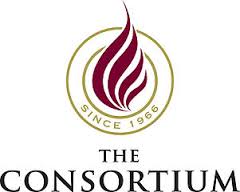
But say you were admitted to Yale SOM but it doesn’t offer you the fellowship—or you don’t get into Yale—then the opportunity to offer you the fellowship is made available to your second-ranked school, and on down the line.
While only one school can offer you the Consortium Fellowship, that does not preclude the other schools on your list from offering you other school-specific scholarship funding. Once awarded by one school, the Consortium Fellowship is not transferable to another.
Regardless of whether you ultimately accept the fellowship and attend the school that offers it, you retain your Consortium membership status, granted as part of the application process. As long as you attend a school within the Consortium, you’ll get take advantage of a wide range of membership benefits, including valuable recruitment and networking events, webinars, and chats.
Why Would Anyone Turn Down a Consortium Fellowship?
Consortium member schools will typically select more students than they have fellowships for to account for the fact that some fellowship recipients will ultimately turn down their offers. What would make a fellowship applicant turn down a free ride to a top-ranked business school, you ask? Sometimes it’s admission to an even higher-ranked business school not part of the Consortium (Harvard, Stanford, Wharton, Columbia, Kellogg, MIT Sloan, and Chicago Booth don’t play the Consortium game). This becomes an easier decision if these other schools offer their own attractive financial aid enticements, which they often do. So in the coming Decision Week(s), keep in mind that schools that have picked you now get to anxiously await word of whether you pick them. It’s nice when the tables get turned, right?
The official Consortium Fellowship notification deadline is March 23rd, but we’d guess many schools will be eager to share the news of the fellowship award in tandem with the news of acceptance. It should be fun to watch on MBA LiveWire! Those of us here at Clear Admit are wishing luck to the applicants and schools involved in today’s Consortium MBA Draft and hope some terrific matches are made, resulting in hundreds of successful MBA careers and further expansion of the Consortium mission’s reach.
To those on MBA Livewire who have speculated about why some Consortium applicants learned of decisions from certain schools before stated decision deadlines, that’s also related to today’s draft. Consortium member schools will have needed to make admissions decisions for their potential drafts picks by today, regardless of the school’s own decision deadline. Some schools may choose to communicate those decisions to applicants early since they already will have been reached.
Learn more about the Consortium application process here. Applications for the Class of 2021 open in August 2018 are due in two rounds, the first in October 2018, and the second in January 2019.
U.S. News Reveals Sneak Peek of Its 2019 Business School Rankings

With just over a week before U.S. News & World Report reveals its eagerly-anticipated 2019 best business school rankings, the publication offered a sneak peek of the business schools that managed to earn spots within the top 10.
Unsurprisingly, the top 10 of the 2019 rankings resembles the publication’s 2018 edition, with nine out of the top 10 schools nearing the top of the annual list. The lone ranking variation from 2018 to 2019 will be the University of Michigan Stephen M. Ross School of Business, which came in 11th in the previous year.
The top ten business schools for the 2019 U.S. News rankings are as follows (unordered):
- The Wharton School at the University of Pennsylvania
- Harvard Business School
- The Booth School of Business at the University of Chicago
- The Kellogg School of Management at Northwestern University
- The Ross School of Business at the University of Michigan
- The Tuck School of Business at Dartmouth University
- The Sloan School of Management at MIT
- The Stanford Graduate School of Business
- University of California—Berkeley (Haas)
The one school left out of the newest rankings from the previous edition was the Yale School of Management.
The publication will release the full list of the 2019 best business school rankings will officially arrive on March 20, 2018. Stay tuned for more updates on the rankings on MetroMBA.
Do Social Networks Affect Our Brains? Two Tuck Professors and a UCLA Professor Research the Truth

We’re you surprised by the results of the 2016 election? According to Tuck Associate Professor of Business Administration Adam Kleinbaum and his research partners—Dartmouth Associate Professor of Psychological and Brain Sciences Thalia Wheatley and UCLA Social Psychology Assistant Professor Carolyn Parkinson—you can blame social media.
In their latest paper, “Spontaneous Neural Encoding of Social Network Position,” the group reviewed how surrounding ourselves with a close-knit group of like minds, such as on social media, can have real-world consequences in politics, business, and more. According to their paper, there’s something called the “naked emperor effect” that occurs when we fall into the trap of only relying on information from trusted networks. The phrase, taken from The Emperor’s New Clothes, explains the tendency of people to place themselves in a bubble to exchange information that no longer holds true.
For their research project, Kleinbaum and Wheatley set out to answer the question, “Do friends see the world in the same way? And if so, what are the implications of that?” To gain insight into the question—including how social networks interact with the physical structure of the brain—they asked 42 first-year Tuck students to watch a series of videos while hooked up to an fMRI machine. They found some interesting results.
According to the scans, the more similar two people’s neural responses the more likely that they would be friends. From this, the authors’ surmised that people who have similar world views are more likely to be friends and that spending time together causes “neuroplastic convergence,” or a physical change in the brain to react similarly. Basically, the human brain can and will evolve to recognize one’s place in a group.
The implications of this research can have some profound effects for companies. Since most people tend to interact with like-minded people and to increase cohesion with their network overtime, this can create a false sense of security. The key is to help your employees be exposed to different ways of thinking.
“Executives worry a lot about being able to anticipate the next big thing, or being disrupted if they fail to anticipate the next big thing,” Kleinbaum explained. “Being exposed to different ways of thinking helps us break out of our thought worlds and imagine possibilities we otherwise might never have thought of.”
To read a more in-depth review of the research paper visit the news release on the Tuck School website. Or you can find the full paper in the April issues of Nature Human Behavior.
This article has been edited and republished with permissions from Clear Admit.
The Top 5 Reasons Diversity MBA Conferences Should Be on Your Recruiting Calendar
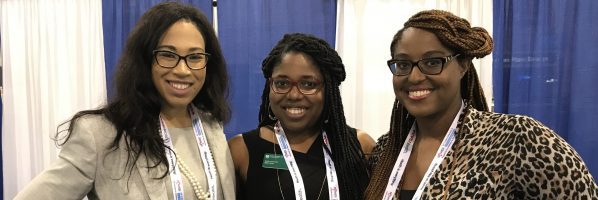
Pictured above: Tuck second-year MBA students Bianca Goins, Sadé Lawrence, and Jodine Gordon.
More than 10,000 MBA students, business school representatives, recruiters, and business executives filled the Pennsylvania Convention Center in Philadelphia late last month for one of the largest career conferences serving minority professionals. The conference has been around since 1970, but for the first time this year the National Black MBA Association (NBMBAA) and Prospanica, the association of Hispanic professionals, joined forces to present it. The result was an incredible opportunity for attendees to network with companies and each other, take advantage of career development programming, and interview for and secure job offers from hundreds of companies spanning multiple industries.
Cornell’s S.C. Johnson Graduate School of Management had a group of approximately 55 students attend, a mix of first-year and second-year students, according to Cynthia Saunders-Cheatham, Executive Director of Johnson’s Career Management Center.
“It was double what we have had in recent years, and perhaps the largest attendance we ever had for an MBA diversity conference,” she said. “Having a joint NBMBAA/Prospanica conference, in addition to the Philadelphia location that was driving distance away [from Ithaca, NY, where Johnson is located], helped to drive attendance.” The connections that students made while there have already resulted in multiple job offers, she added.
While securing a job or internship is a primary reason many MBA students choose to attend the National Black/Prospanica conference and others like it, that’s just one of many potential benefits events like this offer. Given that this most recent conference was right here in our hometown of Philadelphia, we went to check things out for ourselves. Through conversations with attendees, school representatives, and recruiters, we’ve compiled the following list of reasons why this year’s crop of applicants should be sure to add diversity MBA conferences to their recruiting calendar next summer and fall.
1. Unparalleled Recruiter Access—Including Many That Don’t Come to Campus
The Career Expo, which took place on the last two days of the five-day National Black/Prospanica conference, filled a cavernous hall in the Convention Center and included booths from close to 300 companies spanning dozens of industries. Among them were coveted post-MBA tech employers like Google and Amazon, consulting industry leaders including Bain & Company and Accenture, and financial services firms such as BlackRock, Bank of America, and Morgan Stanley. There was a continuous gaggle at the Google booth, and one of its MBA internship recruiters, Tanya Choudhury, had to resort to wearing a sign by the second day explaining that she’d lost her voice.
Big pharma and healthcare were also well represented, with booths attended by recruiting representatives from drug maker AstraZeneca to medical products and equipment company Zimmer Biomet and many in between. Leading consumer packaged goods (CPG) firms including PepsiCo, General Mills, and Proctor & Gamble were also there, as were oil and gas giants like BP, Chevron, and Exxon.
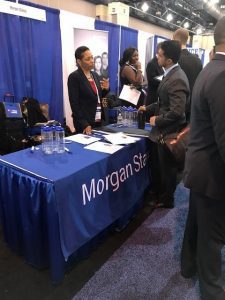
Morgan Stanley was one of almost 300 exibitors in the conference’s packed Career Expo.
But there were also plenty of organizations that are perhaps less top of mind as potential MBA recruiters—the Central Intelligence Agency, the U.S. Department of State, Teach for America, and USAID, for example—who were just as eager to share how highly they value the MBA skillset. Dozens of leading business schools also had booths, largely to provide support and serve as gathering places for students who were attending, but also with an eye out for promising diverse talent. For example, Roberto Martinez, a Senior Talent Acquisition Consultant for Dartmouth College—home to the Tuck School of Business—was eagerly distributing glossy handouts touting the school’s varied career opportunities, commitment to diverse hiring practices, and excellent benefits. “We’re here not only to support students but also to hire more diverse staff to campus,” he said.
For Tuck second-year MBA student Bianca Goins, the breadth of companies at the expo was a big part of the draw. “I wanted a diverse group of companies to look at in a single spot,” she said. “There are so many companies here, and as second-year you can really come and pick and choose the experiences you want to have.”
Tiffany Anderson, a second-year student at Emory’s Goizueta Business School, was also impressed by the sheer number of companies present. A self-proclaimed conference veteran, she also attended National Black last year, as well as conferences presented by the Forté Foundation, the Consortium for Graduate Study in Management, Management Leadership for Tomorrow, and JumpStart. “Out of all the diversity conferences, I would certainly say this is the flagship,” she said. “Wow! There are A LOT of companies here,” she recalled thinking to herself as she walked in. More so than last year, before National Black and Prospanica teamed up, she added.
“I have seen the most people—students from many different schools and recruiters from many different functional areas of interest,” she continued. “It seems to be the most diverse in terms of attendees, degree of programming, and companies in attendance. For the majority of people, this is going to be one of the best to attend.” Anderson estimates that there were probably 30 or so Goizueta students there, a mix of first- and second-years.
2. Multiple Touch Points and Opportunities for Face Time
For some students, certainly, the primary purpose in attending the conference is to land a job. Second-year IU Kelley School of Business MBA student Henrique Barbosa, a native of Brazil pursuing travel hospitality, had a simple answer when asked why he was there: “To get a job!” He acknowledged that most of the firms he was interested in only conduct first-round interviews at the conference followed by second-round interviews on site, which lessened the likelihood of his leaving with an offer in hand. “But it would be great if it happened,” he said.
But several other students were less interested in job or internship offers—or even in early round interviews. For Jodine Gordon (Tuck ’18), the biggest factor in her decision to attend was hearing success stories from Tuck grads whose higher-level touch points with conference recruiters later helped them secure offers. “I have a couple companies on my list, but really I just want to meet as many people as possible so they can get to know me and I can get face time,” she said.
Sadé Lawrence, also a second-year student at Tuck, was likewise attracted by the opportunity to get in front of recruiters in person. “For a lot of opportunities you might be interested in, you start online at a website, applying through data base,” she said. “But coming here they now have a face with your name, and there are all kinds of organic connections that can happen,” she added. “It’s kind of amazing that you are able to build connections with people even at such a big conference, but you are. You make contacts and get lots of face time—so much more so than you can blindly through a website,” she continued. “What I have heard more of is people have an interaction with a recruiter here that leads to an interview later—here is more about entering the pipeline.”
Tuck’s Goins has taken the opportunity to network with recruiters who don’t make it to Tuck’s campus, but also those who do. “With every interaction, you are getting a more nuanced understanding of the company and can take that information and use it in subsequent interactions.”
3. Valuable Chances to Network with Peers
Goizueta’s Anderson interned in operations at Google over the summer—an opportunity she got through another diversity conference—and has been offered a full-time position on the tech giant’s Mountain View campus after she graduates. Despite having that full-time offer in hand, attending the conference still made lots of sense.
Kelley School second-year student Luis Vilchez Kupres, a native of Peru, also converted his summer internship—in supply chain operations at Cummins—into a full-time offer. So his reasons for attending the conference were not to get a job. ”I am here to support fellow Kelley first- and second-years and network a little more,” he said. He also gets to reconvene with students from other schools he met at last year’s Prospanica conference. “Often, you connect with somebody and they will help you connect with someone else,” he said. “Networking definitely helps—even among other MBA students.”
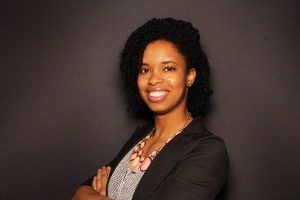
Tiffany Anderson, Goizueta MBA ’18, a diversity MBA conference veteran
For the Google-bound Anderson, the value of peer networking can’t be stressed enough. Being able to connect with students from other schools is the part she finds most enjoyable—but it’s also strategic. “When candidates are selecting a school they like to look at the size of the network they are going to get—and that’s great,” she said. “But the way I see it, I don’t have to be at Stanford or Wharton because I have friends at Stanford and Wharton. So in a way that’s kind of my network, too.”
“You have that domino effect,” she continued. If she’s trying to connect with someone at a company where she doesn’t have a contact or her classmates don’t have contacts, she can reach out to a friend at another school to see if there’s someone in their network. “Some might say, ‘Well, they’re a peer, they’re not an employer, they’re not going to get me a job.’ But there is so much more benefit to expanding your network. I don’t think everyone understands that.”
Of course, peer networking can be a two-way street. “My motivation to expand my network comes from wanting to help others as well,” Anderson said. “When you are part of these diversity networks, one of the great things is you are going to have a friend who says, ‘Do you know someone who can help me with this?’ And I can say, ‘Well, I met someone at a conference who does that very thing and I’m happy to put y’all in touch.’”
